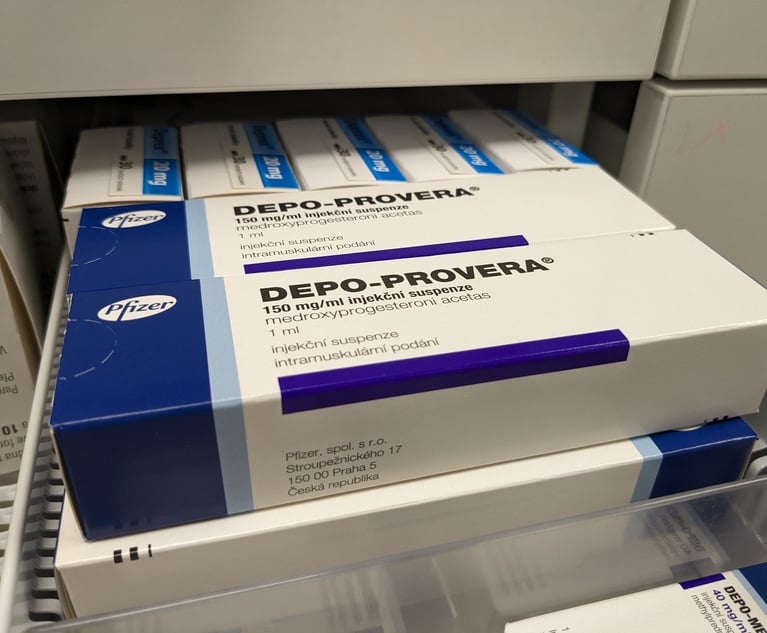New Top Dean, AI for All, 'Bad Faith' Bias?: The Morning Minute
Here's the news you need to start your day.
February 07, 2019 at 06:00 AM
4 minute read
➤➤ Want to get this daily news briefing by email? Here's the sign-up.
|
WHAT WE'RE WATCHING
|TOP OF THE HEAP - Stanford Law School is getting a new dean. Karen Sloan reports that Jenny Martinez, an international law and constitutional law scholar who is Hispanic, will join the growing number of women—and particularly minority women—occupying the dean suites in law campuses across the country. Women now make up about a third of deans at ABA-accredited law schools. An expert on the impact of courts on human rights, Martinez on April 1 succeeds Elizabeth Magill, who is leaving to become provost of the University of Virginia.
MIND GAMES - Microsoft has put the final touches on the artificial intelligence for a new legal aid tool to help address access to justice problems. Frank Ready reportsthat a post on the tech giant's blog indicates it has wrapped up work on the AI that will serve as the brainpower for the tool, named Legal Navigator, developed in partnership with the Legal Services Corp., Pro Bono Net, Pew Charitable Trusts and Avanade. Legal Navigator won't offer advice—so don't abandon your career just yet—but it is designed to walk users step-by-step through legal processes, such as executing a divorce.
ON APPEAL? The DOJ is considering whether it will try to block, through an appeal to SCOTUS, benefits for as many as 52,000 “blue water” Navy veterans who claim they were exposed to Agent Orange during the Vietnam War. Major law firms, including Paul Hastings; Hogan Lovells; and DLA Piper have filed amicus briefs supporting blue water veterans. Marcia Coyle reports that the DOJ has asked the Federal Circuit to put on hold its ruling in favor of the veterans pending the government's decision to ask the Supreme Court to review it. The government has argued the Agent Orange Act applies only to the geographic landmass of Vietnam.
|
EDITOR'S PICKS
|Orrick Team Accuses US Labor Dept. of 'Bad Faith' in Bias Case
ADT Alarm Company Secures New Chief Legal Officer From Tech Gaming Business
|
WHILE YOU WERE SLEEPING
|DUBLIN DEAL - Clark Hill has merged with an Irish operation to expand the Dublin outpost for the Detroit-born law firm. Dan Packel reports that Clark Hill's deal with O'Gradys Solicitors brings its Dublin headcount to 19 lawyers. The firm has more than 650 lawyers.
|
WHAT YOU SAID
“We weren't elected because we are female. We were elected because our classmates saw that we would be the best fit for the positions.”
— LAUREN KLOSS, UPCOMING EDITOR-IN-CHIEF OF THE CORNELL LAW REVIEW, ON THE ELECTION OF AN ALL-WOMEN EXECUTIVE BOARD OF THE LAW SCHOOL'S FLAGSHIP PUBLICATION.
➤➤ Sign up here to receive the Morning Minute straight to your inbox.
This content has been archived. It is available through our partners, LexisNexis® and Bloomberg Law.
To view this content, please continue to their sites.
Not a Lexis Subscriber?
Subscribe Now
Not a Bloomberg Law Subscriber?
Subscribe Now
NOT FOR REPRINT
© 2024 ALM Global, LLC, All Rights Reserved. Request academic re-use from www.copyright.com. All other uses, submit a request to [email protected]. For more information visit Asset & Logo Licensing.
You Might Like
View All

From 'Confusing Labyrinth' to Speeding 'Roller Coaster': Uncertainty Reigns in Title IX as Litigators Await Second Trump Admin
6 minute read
New Class Action Points to Fears Over Privacy, Abortions and Fertility
Trending Stories
- 1People in the News—Dec. 2, 2024—Marshall Dennehey, Pollock Begg
- 2How I Made Partner: 'Prioritize What Is Important to You, Do What Energizes You,' Says Sarah Wellings of Sullivan & Worcester
- 3'That Decision was Wrong:' Federal Judge Rethinks Consumer Protection Class Certification
- 4Bar Report — Dec. 2, 2024
- 5The Impact of Erlinger on Predicate Felony Sentencing Statutes
Who Got The Work
Michael G. Bongiorno, Andrew Scott Dulberg and Elizabeth E. Driscoll from Wilmer Cutler Pickering Hale and Dorr have stepped in to represent Symbotic Inc., an A.I.-enabled technology platform that focuses on increasing supply chain efficiency, and other defendants in a pending shareholder derivative lawsuit. The case, filed Oct. 2 in Massachusetts District Court by the Brown Law Firm on behalf of Stephen Austen, accuses certain officers and directors of misleading investors in regard to Symbotic's potential for margin growth by failing to disclose that the company was not equipped to timely deploy its systems or manage expenses through project delays. The case, assigned to U.S. District Judge Nathaniel M. Gorton, is 1:24-cv-12522, Austen v. Cohen et al.
Who Got The Work
Edmund Polubinski and Marie Killmond of Davis Polk & Wardwell have entered appearances for data platform software development company MongoDB and other defendants in a pending shareholder derivative lawsuit. The action, filed Oct. 7 in New York Southern District Court by the Brown Law Firm, accuses the company's directors and/or officers of falsely expressing confidence in the company’s restructuring of its sales incentive plan and downplaying the severity of decreases in its upfront commitments. The case is 1:24-cv-07594, Roy v. Ittycheria et al.
Who Got The Work
Amy O. Bruchs and Kurt F. Ellison of Michael Best & Friedrich have entered appearances for Epic Systems Corp. in a pending employment discrimination lawsuit. The suit was filed Sept. 7 in Wisconsin Western District Court by Levine Eisberner LLC and Siri & Glimstad on behalf of a project manager who claims that he was wrongfully terminated after applying for a religious exemption to the defendant's COVID-19 vaccine mandate. The case, assigned to U.S. Magistrate Judge Anita Marie Boor, is 3:24-cv-00630, Secker, Nathan v. Epic Systems Corporation.
Who Got The Work
David X. Sullivan, Thomas J. Finn and Gregory A. Hall from McCarter & English have entered appearances for Sunrun Installation Services in a pending civil rights lawsuit. The complaint was filed Sept. 4 in Connecticut District Court by attorney Robert M. Berke on behalf of former employee George Edward Steins, who was arrested and charged with employing an unregistered home improvement salesperson. The complaint alleges that had Sunrun informed the Connecticut Department of Consumer Protection that the plaintiff's employment had ended in 2017 and that he no longer held Sunrun's home improvement contractor license, he would not have been hit with charges, which were dismissed in May 2024. The case, assigned to U.S. District Judge Jeffrey A. Meyer, is 3:24-cv-01423, Steins v. Sunrun, Inc. et al.
Who Got The Work
Greenberg Traurig shareholder Joshua L. Raskin has entered an appearance for boohoo.com UK Ltd. in a pending patent infringement lawsuit. The suit, filed Sept. 3 in Texas Eastern District Court by Rozier Hardt McDonough on behalf of Alto Dynamics, asserts five patents related to an online shopping platform. The case, assigned to U.S. District Judge Rodney Gilstrap, is 2:24-cv-00719, Alto Dynamics, LLC v. boohoo.com UK Limited.
Featured Firms
Law Offices of Gary Martin Hays & Associates, P.C.
(470) 294-1674
Law Offices of Mark E. Salomone
(857) 444-6468
Smith & Hassler
(713) 739-1250










